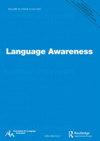Differential effects of metalinguistic awareness components in early foreign language acquisition of English vocabulary and grammar
IF 2.2
2区 文学
0 LANGUAGE & LINGUISTICS
引用次数: 2
Abstract
Abstract Metalinguistic awareness (MLA) is a predictor of adult foreign language (FL) learning in instructed settings. Following Bialystok and Ryan (1985) two-component model of MLA, we distinguish ML analysis as the ability to compare and select language items from ML control as the ability to detect and manipulate rule-based linguistic patterns. So far, there is little evidence how components of MLA interact, and how they affect learning outcomes in early FL learning. In this paper, we investigate the effects of MLA on FL learning of English in primary school, where learning is mostly oral and proficiency in the target language is still rudimentary. We tested 200 students in German public primary schools on English vocabulary and grammar. Metalinguistic (ML) analysis was assessed in an interview, while ML control was operationalized in phoneme manipulation and letter fluency tasks. In addition, we assessed personal, cognitive, and social covariates. Results from linear mixed effects regression analyses indicate that (a) ML control predicts ML analysis skills, (b) ML analysis fosters FL vocabulary outcomes, and (c) ML control benefits grammar skills. We discuss theoretical and practical implications. Plain language summary In this paper, we studied how primary-school-age children’s knowledge about language helps them learning a foreign language. Specifically, we examined two aspects of what has been termed ‘metalinguistic awareness’. Theory assumes that metalinguistic awareness consists of (a) knowledge of how languages work and how they are similar or different (metalinguistic analysis) and (b) skills to manipulate or rearrange elements of language and play with them (metalinguistic control). For instance, speakers know how words are ordered in a sentence and how to add endings to make words rhyme. We were interested in how these two aspects of awareness are connected and how they help learners in different areas of foreign language learning. To answer these questions, we collected data from 200 4th-graders in Germany with different linguistic and social backgrounds learning English as a foreign language. We were particularly interested in the early stages of learning a foreign language, where proficiency is still limited. Results show that metalinguistic awareness indeed consists of an analysis and a control component affecting different parts of foreign language learning. Whereas the ability to compare linguistic structures (metalinguistic analysis) is important for English vocabulary learning, the manipulation of language elements (metalinguistic control) helps learning English grammar. Since different types of metalinguistic awareness are important factors during the learning process, teachers should incorporate activities that foster both in the classroom. Overall, comparing and reflecting on language(s) on a metalinguistic level can be a fruitful approach even at the beginning stages of foreign language learning.元语言意识成分在早期外语词汇语法习得中的差异效应
摘要元语言意识(MLA)是指导环境下成人外语学习的预测因子。根据Bialystok和Ryan(1985)的MLA双成分模型,我们将ML分析区分为从ML控制中比较和选择语言项目的能力,以及检测和操纵基于规则的语言模式的能力。到目前为止,几乎没有证据表明MLA的组成部分是如何相互作用的,以及它们如何影响早期外语学习的学习结果。在本文中,我们调查了MLA对小学英语外语学习的影响,在小学英语学习主要是口头的,对目标语言的熟练程度仍然很低。我们对德国公立小学的200名学生进行了英语词汇和语法测试。元语言(ML)分析在访谈中进行了评估,而ML控制在音位操纵和字母流利性任务中进行了操作。此外,我们评估了个人、认知和社会的协变量。线性混合效应回归分析的结果表明:(a)ML控制预测ML分析技能,(b)ML分析促进FL词汇结果,(c)ML控制有利于语法技能。我们讨论了理论和实践意义。简明语言总结在本文中,我们研究了小学年龄儿童的语言知识如何帮助他们学习外语。具体来说,我们研究了所谓的“元语言意识”的两个方面。理论认为,元语言意识包括(a)关于语言如何工作以及它们如何相似或不同的知识(元语言分析)和(b)操纵或重新排列语言元素并加以利用的技能(元语言控制)。例如,说话者知道单词在句子中的顺序,以及如何添加词尾使单词押韵。我们感兴趣的是这两个方面的意识是如何联系在一起的,以及它们如何帮助外语学习的不同领域的学习者。为了回答这些问题,我们收集了来自德国200名四年级学生的数据,他们有不同的语言和社会背景,学习英语作为外语。我们对学习外语的早期阶段特别感兴趣,那里的熟练程度仍然有限。结果表明,元语言意识实际上包括一个影响外语学习不同部分的分析和控制成分。尽管比较语言结构的能力(元语言分析)对英语词汇学习很重要,但语言元素的操纵(元语言控制)有助于学习英语语法。由于不同类型的元语言意识是学习过程中的重要因素,教师应在课堂上开展促进这两者的活动。总的来说,即使在外语学习的最初阶段,在元语言层面上比较和反思语言也是一种富有成效的方法。
本文章由计算机程序翻译,如有差异,请以英文原文为准。
求助全文
约1分钟内获得全文
求助全文
来源期刊

Language Awareness
Multiple-
CiteScore
3.70
自引率
10.00%
发文量
18
期刊介绍:
Language Awareness encourages and disseminates work which explores the following: the role of explicit knowledge about language in the process of language learning; the role that such explicit knowledge about language plays in language teaching and how such knowledge can best be mediated by teachers; the role of explicit knowledge about language in language use: e.g. sensitivity to bias in language, manipulative aspects of language, literary use of language. It is also a goal of Language Awareness to encourage the establishment of bridges between the language sciences and other disciplines within or outside educational contexts.
 求助内容:
求助内容: 应助结果提醒方式:
应助结果提醒方式:


